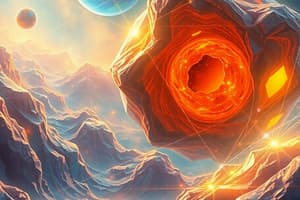Podcast
Questions and Answers
What is the characteristic of a gas in terms of volume and shape?
What is the characteristic of a gas in terms of volume and shape?
- Variable volume and fixed shape
- Fixed volume and variable shape
- No fixed volume or shape (correct)
- Fixed volume and fixed shape
Which physical state has a distinct volume independent of its container and is not compressible to any appreciable extent?
Which physical state has a distinct volume independent of its container and is not compressible to any appreciable extent?
- Gas
- Liquid (correct)
- Solid
- Plasma
Under what conditions does a plasma form?
Under what conditions does a plasma form?
- At low temperature
- At room temperature
- Inside stars (correct)
- at high pressure
What is the typical charge carrier in a plasma?
What is the typical charge carrier in a plasma?
What are the observable properties that differ among the states of matter?
What are the observable properties that differ among the states of matter?
What determines the state of a substance according to the passage?
What determines the state of a substance according to the passage?
What is the main reason for substances to be in different states at room temperature and standard pressure?
What is the main reason for substances to be in different states at room temperature and standard pressure?
Which type of molecule exhibits complete freedom of motion due to kinetic energies overpowering particle–particle attraction?
Which type of molecule exhibits complete freedom of motion due to kinetic energies overpowering particle–particle attraction?
What are intermolecular forces weakened relative to, as mentioned in the passage?
What are intermolecular forces weakened relative to, as mentioned in the passage?
What reflects the lower strength of the intermolecular forces of attraction between water molecules compared to covalent bonds within it?
What reflects the lower strength of the intermolecular forces of attraction between water molecules compared to covalent bonds within it?
Flashcards are hidden until you start studying
Study Notes
Characteristics of Gases
- Gases have no fixed volume or shape, expanding to fill their container.
Distinct Volume State
- Solids maintain a distinct volume that is independent of their container and are not compressible significantly.
Conditions for Plasma Formation
- Plasma forms under high energy conditions, such as extreme temperatures or electrical fields, that strip electrons from atoms.
Charge Carriers in Plasma
- The typical charge carrier in a plasma is ions, which are charged particles resulting from electron removal.
Observable Properties of Matter States
- Observable properties that vary among states of matter include shape, volume, and the ability to flow or compress.
Determinants of State of Substance
- The state of a substance is determined by temperature and pressure, influencing the arrangement and energy of particles.
Room Temperature and Standard Pressure States
- The primary reason substances exist in various states at room temperature and standard pressure is due to differences in intermolecular forces.
Molecules with Complete Motion Freedom
- Gases exhibit complete freedom of motion as their kinetic energy significantly overcomes particle–particle attractions.
Reference for Intermolecular Forces Strength
- Intermolecular forces are weakened relative to thermal energy, affecting how particles interact in different states.
Water Molecule Intermolecular Forces
- The lower strength of intermolecular forces of attraction between water molecules compared to covalent bonds reflects the nature of interactions within substances.
Studying That Suits You
Use AI to generate personalized quizzes and flashcards to suit your learning preferences.




